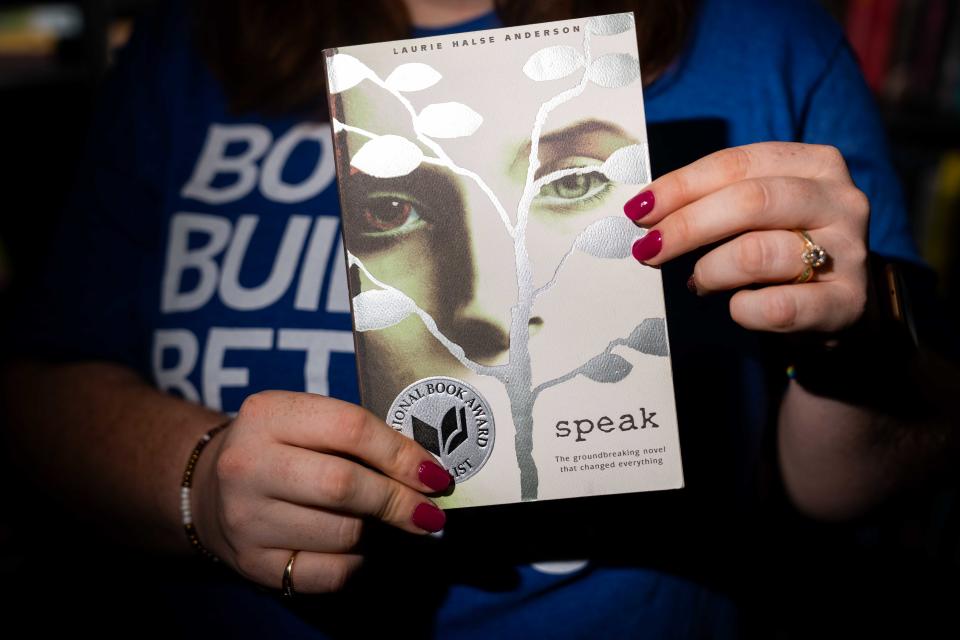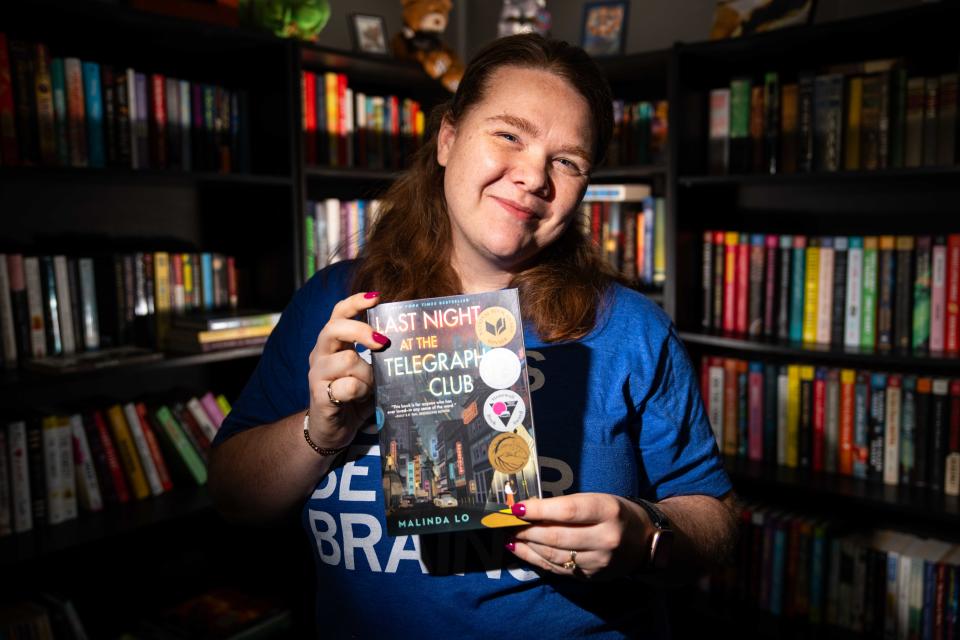'It's going to hurt so many people': Iowa book ban law draws lawsuits from students, families
Seventh-grade Norwalk teacher Alyson Browder has always thought of her classroom as a place where students can be themselves.
A teacher for 10 years, she's built a classroom library with more than 1,700 books, which run the gamut from showcasing characters with disabilities to those who identify as LGBTQ+. A pride flag on the wall behind her desk declares the room a safe space.
Yet she believes her collection's inclusivity is now threatened by a new state law that bans most books that feature sex acts and bars instruction and discussion on gender identity and sexual orientation through sixth grade. The law also requires school administrators to notify caregivers if students request to use pronouns that differ from their sex assigned at birth.
When Republican lawmakers passed Senate File 496 in 2023, they argued it would give parents and caregivers more control over their children's education.
But Browder finds the law divisive and alienating toward LGBTQ+ students and their families. So she personally decided to not remove any books from her classroom, even though the law says any teacher or school staff member who does not remove materials could receive a reprimand from the Iowa Board of Educational Examiners or lose their license.
"I'm not going to do more harm to this community where so many things in our society is harming them as is,” she said. “I'm not going to be one more person to knock them down. And by removing even one book, for me, it's me taking away from that community."

Browder is one of several Iowa educators and families who have banded together with book publishers, authors and education groups to file two federal lawsuits against the sweeping education bill, which they believe is harmful and discriminatory.
In late November 2023, the American Civil Liberties Union of Iowa and Lambda Legal filed a lawsuit against the state in federal court on behalf of eight Iowa students and their families and the nonprofit Iowa Safe Schools. The lawsuit seeks to block parts of the law pertaining to teaching about sexual orientation and gender identity, the removal of books depicting sex acts and the requirement to inform parents if a student wants to use a different pronoun at school.
Iowa's Book Ban Battle 2023: In 3 years, 60 books have been challenged in Iowa schools. A new law could ban far more.
Penguin Random House, the Iowa State Education Association, authors whose books were banned as a result of the law, and several educators and one parent followed suit and filed a second lawsuit in federal court over the book ban. Hachette Book Group, HarperCollins Publishers, Macmillan Publishers, Simon & Schuster and Sourcebooks joined them in the legal fight last month.
A number of families and educators attached to the lawsuits had attended hearings at the Capitol and taken part in protests long before they joined the suits.
"We are honored to represent these families,” said Thomas Story, the ACLU’s attorney. “Their bravery allows us to protect everyone's rights.”
Here are some of their stories:
Puck Carlson, Iowa City senior: Students have a right to read books about them

Puck Carlson remembered the moment they felt the weight of Senate File 496.
The Iowa City high school senior was in class — second period AP research — as they listened to their favorite teacher rattle off book titles that would soon leave the shelves. Carlson, 17, who uses they/them pronouns, started to tear up and thought, "OK, now what?"
"Every kid has the right to go into a school and learn about the people who look like them, who are like them, who share cultural and identity aspects like them," Carlson said. "The fact that that was something that was being taken away really frustrated me because that was something I felt was critical for me."
Carlson, one of the plaintiffs in the lawsuit with the ACLU of Iowa and Lambda Legal, had turned to the children's novel "Melissa," by Alex Gino — a story about a young transgender girl — to help them understand their own little sister. "Melissa" for three years in a row was one of the most challenged books in the United States and has appeared on several banned book lists in Iowa schools.
Related: The author of one of America's most challenged kids books says 'trans people are unsafe'
And they relied on other books for their own journey.
William Shakespeare's "A Midsummer Night's Dream" inspired Carlson to pick Puck, a character in the play, as their chosen name. They said they felt drawn to Puck, a clever sprite who often has been depicted as androgynous. (The Register is not aware of "A Midsummer Night's Dream" being included in any Iowa school book ban lists.)
Carlson said they also learned more about themselves through Malinda Lo's "Last Night at the Telegraph Club," a coming-of-age queer story about a Chinese American girl in 1950s San Francisco. That book also has appeared on banned book lists in Iowa schools. Lo is among the plaintiffs in the Penguin Random House lawsuit along with authors Laurie Halse Anderson, John Green and Jodi Picoult.
"Being able to read stories about people who I could relate to was important for me to be willing to understand myself," Carlson said. "It gave me the confidence, the terminology and the care to be able to go, 'OK, maybe this is what I'm experiencing and maybe that's OK, you know?'"

Richard and Ulrike Carlson, Puck's parents, who also are listed as plaintiffs, said their decision to be part of the case was easy. The couple had already seen other new laws that have affected their children such as Senate File 482, which restricts the bathrooms transgender students can use.
"You kind of see your children have to carry this anxiety around with them, this fear and this feeling of not being included," Ulrike Carlson said. "There was just anger and resignation and also a little bit of wish to leave Iowa."
The Carlsons wanted to take action.
"If not us, then who?" Ulrike Carlson asked.
"There's a lot of good reasons not to do something like that," she explained. "We're certainly a private family. We are who we are, but in the end, you have to lead. You have to stand up and do what is right."
"Is it more important to me to be mildly uncomfortable and do the right thing than it is for me to be perfectly fine and not do anything?" Puck Carlson said. "I think it's always a better decision to be mildly uncomfortable and do the right thing."
The Rev. Brigit Stevens: LGBTQ youth are 'not allowed to be who they are'
Dinnertime at the Stevens household is sacred, a daily ritual that parents Brigit and Joe Stevens have found crucial for their children and family as a whole. Budding crushes and friendships are just a couple of the topics welcome at the table. The youngest member of the Stevens family — Berry Stevens — came out as queer years ago over dinner.
"That's how dinner rolls around here," said Brigit Stevens, a pastor from West Des Moines and one of the plaintiffs in a lawsuit with the ACLU of Iowa and Lambda Legal. "It's lifesaving. It keeps my kids alive."
"My No. 1 job as a parent is to keep my kids safe, and that includes their physical safety, their emotional safety, and their spiritual safety," the 48-year-old said about the importance of regularly striking up conversations with her children. "... Every kid is growing into who they are going to be, and then it's my job as an adult in their life to honor that, to celebrate that and to protect that."

For Stevens, getting involved in the lawsuit felt like an extension of her role as a mother to fight for her 13-year-old Berry. Stevens said she felt like Senate File 496 was a result of the state's "culture of politics" that placed a "direct attack" on Berry, who is nonbinary and uses they/them pronouns, and other families like theirs.
"You'll hear in all the commentary against the bills that get passed, including SF 496, is the increased mental health challenges and suicide rates of trans and LBGTQ kids," she continued. "That's because they're not being celebrated. They're being hemmed in and not allowed to be who they are.
"It's not that they're inherently mentally ill to begin with. It's that the culture has said, 'There's something wrong with you,' when there's not. But we've created this problem, and this law helps perpetuate that."
Berry Stevens said they felt "amazing" whenever they came across stories with relatable characters.
"Finding a book with good representation on different types of people feels so good, especially when it's relating to you," explained the eighth grader, who also is named in the lawsuit.

Berry, who changed their name and pronouns in sixth grade, said their life would have been tougher had the law been in place two years ago.
"I wouldn't have been able to fully feel safe without a teacher, or administrator, or principal, or counselor to lean on because they wouldn't be able to do anything," they said.
"Imaging that if those limited tools I had at the time were removed ..." their mother paused, "It was already a pretty, pretty dark and scary year for us. So, it's not a hyperbole to say being able to be out, and supported, and open in your own way is lifesaving."
Percy Batista-Pedro, Waterloo student: Book ban law is 'terrible'

The love, acceptance and even the medical care junior Perseus “Percy” Batista-Pedro received for his gender dysphoria motivated him to join the ACLU's lawsuit.
“I've had amazing experiences in school with teachers and friends and peers that have always been supportive for the most part,” Batista-Pedro, 17, said. "And to have this law, it blocks that, and it hurts it, and it makes it so much harder to find that community.”
Joining in the lawsuit makes it hard to find a balance between school, extracurriculars, leading Waterloo West High School’s gender-sexuality alliance and spending time with his boyfriend of almost two years.
Related: Iowa Poll: Half say new law requiring schools to ban books depicting sex acts goes too far
“I've spent a lot of my time on this lawsuit, which I won't get back, and these are my important fundamental teenage years where I'm growing into an adult,” Batista-Pedro said. “And instead of using that time to devote myself … I was writing my declaration, reading and writing emails, doing research on my own, reading banned books to make myself more knowledgeable (and) talking with lawyers.”
He initially thought the bill would never pass. Since Senate File 496 went into effect, though, he has seen the impact on his and others’ mental health.
“It's terrible and it's going to hurt so many people,” Batista-Pedro said.

His mother, Belinda Scarrott, feels “legitimate terror” when Batista-Pedro leaves for work or school because she fears someone might harm him for who he is as a person.
Related: Iowa teachers union calls on schools to restore banned books. Some districts already are
“All he wants to do is just be a 17-year-old high schooler,” she said.
Batista-Pedro said he feels the sacrifice is worth it because the lawsuits show Iowa’s LGBTQ youth they are not alone.
“It's wonderful to feel like I'm doing something and feel that power that comes with that, and it's very much a boost to my mental health,” he said.
Alyson Browder, teacher: 'Their lives are more important' than her job

Browder’s classroom library boasts a massive collection — 1,752 books to be exact. The Norwalk Middle School teacher says she's spent years building this extensive catalog of diverse stories with characters that she hoped her students could relate to and learn from.
A seventh-grade English teacher, Browder knows just how tough adolescence can be, but believes reading books can help ease that transition. She saw the fleet of authors docked on her shelf as a lifeline for her young students, especially the "odd ducks" who struggled to fit in — a refuge now threatened by the new education law.
That's why Browder joined the federal lawsuit with the Iowa State Education Association and Random House over Senate File 496. She's fighting for her students even if it means she could lose her job.

Browder, 33, has received several letters and emails from former students over the years who have thanked her for her book collection. She remembered past students opening up years later about feeling lost in middle school or coping with self-harm as pre-teens. Somewhere on their journey, her students told her, they plucked a book from her shelf that changed their lives.
"I'm like, 'How am I going to turn my back on these kids?'" she said.
Browder said she recognized the risks that came with refusing to remove books from her classroom library. Last fall, as Iowa school districts dove into uncharted territory to uphold the new law, Browder walked into a new chapter of her life. She was newly pregnant and feared the repercussions for speaking out.
Related: After federal judge's injunction on Iowa's book ban law, confusion and concerns linger
"We're already a paycheck-to-paycheck family. Teachers don't make a lot of money," Browder explained. "We can't afford a mortgage payment on just my husband's income."
Because she believes her students' lives are at stake, she was willing to put her family's income on the line.
"Their lives are more important than my temporary spot in life right now," she said. "If I get fired, I will eventually be able to find something else."
What's the status of the book ban lawsuits?
Beyond the state, Urbandale Community School District officials also are named in both lawsuits. Norwalk school officials are named in the Penguin lawsuit, and Iowa City, Waterloo and West Des Moines school officials are listed as defendants in the ACLU's lawsuit.
In both cases, U.S. District Court Judge Stephen Locher in December placed an injunction on the parts of the law related to the ban on books depicting sex acts and barring instruction of sexual orientation and gender identity through sixth grade. Locher’s ruling also blocked the law’s penalties for teachers and school officials who did not remove books that violated the law by the Jan. 1 deadline.
A number of school districts across the state returned books to library shelves following the injunction.
Locher did not block the part of the law that requires families to be notified if their child requests to use a different name or pronoun.
In early January, the state appealed the injunction. A hearing is scheduled June 11 in St. Paul, Minnesota.
Samantha Hernandez covers education for the Register. Reach her at (515) 851-0982 or svhernandez@gannett.com. Follow her on Twitter at @svhernandez or Facebook at facebook.com/svhernandezreporter.
F. Amanda Tugade covers social justice issues for the Des Moines Register. Email her at ftugade@dmreg.com or follow her on Twitter @writefelissa.
This article originally appeared on Des Moines Register: Iowa’s book ban law, SF 496, called ‘harmful’ by students, families

